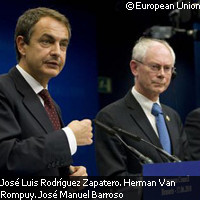EU leaders agree on 10-year plan
Eco-innovation, digital developments and new skills are the drivers for future growth in Europe and the focus of the Europe 2020 Strategy. Formally adopted by the European Council on 17 June 2010, the plan for the coming decade is to get back to basics. This means sound national finances primed for new developments and a stronger, more prosperous Europe. Developed in response to the global financial crisis, EU leaders hope Europe 2020 is the right answer to counter the high levels of unemployment, poor structural growth and substantial levels of debt facing Europe today. Its success depends on Europe acting collectively and with greater coordination. Speaking at the conclusion of the meeting at which the European Council approved the objectives of the strategy, European Commission President José Manuel Barroso expressed his satisfaction that a unanimous decision had been made 'not only on the broad lines' but on specific targets for Europe 2020. The EU leaders agreed that the new strategy is a way to orient their policies away from crisis management to fiscal consolidation and structural reform. They also agreed to develop shared objectives for the strategy's five headline targets: promoting employment; improving the conditions for innovation, research and development; meeting the EU's climate change and energy objectives; improving education levels; and promoting social inclusion specifically by reducing poverty. The Europe 2020 Strategy reaffirms the goal of boosting research and development (R&D) spending in Europe from 1.9% of gross domestic product (GDP) to 3%. Another goal is to reach a 75% employment rate for men and women, and to reduce greenhouse gas emissions by 20%. EU Member States are expected to act rapidly, in close dialogue with the European Commission, to implement these policy priorities and to finalise their national targets. These will be developed according to each country's own starting positions and decision-making structures, and progress towards these goals will be reviewed regularly. 'In Europe and globally, the key is growth,' said President Barroso. 'In Europe, sustainable and inclusive growth must be built on sound finances. Fiscal consolidation and structural reform are essential for growth. Consolidation is necessary for confidence and without confidence there will be no growth.' 'And we must focus on the key drivers for future growth: eco-innovation, digital agenda, new skills. This is exactly what we have put forward in our Europe 2020 Strategy,' added President Barroso. As part of the strategy, the European Council also endorsed the first flagship initiative of a digital agenda for Europe. The leaders agreed that the agenda should be based on concrete proposals and include the creation of a fully functional digital single market by 2015. The European Commission was invited to present other flagship initiatives by the end of 2010, and to report on the digital agenda's progress by 2011.



